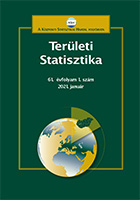A Klebelsberg-féle népiskolai program területi hatásai
Regional effects of the elementary school program of Kunó Klebelsberg
Author(s): György Muity, Ádám Nagy, Gábor PirisiSubject(s): History, Social Sciences, Economy, Geography, Regional studies
Published by: Központi Statisztikai Hivatal
Keywords: educational policy; regional development; elementary school development; urbanisation
Summary/Abstract: Count Kunó Klebelsberg was a significant member of Hungarian politics in the interwar period. He served as minister of religion and education of the Bethlen-government between 1922 and 1931. During his tenure, he started and man-aged several reform programs regarding different aspects of public- and higher education, science, and cultural diplo-macy in Hungary; these usually have a very positive reception, regardless of their conservative and nationalist ap-proach. The authors would like to intro-duce in this paper a new interpretation of the best-known element of Klebelsberg’s cultural policy, namely the elementary school program. This expansive program could be analysed not only in cultural policy context, but also as an adequate response to certain issues of regional development. With the GIS-based analysis of a database from 1928, the authors would like to reveal the complex response of the cultural policy to the challenges of urbanisation, covering much more, than building new schools in the outskirts of the Great Hungarian Plain.
Journal: Területi Statisztika
- Issue Year: 63/2023
- Issue No: 03
- Page Range: 335-357
- Page Count: 23
- Language: Hungarian

